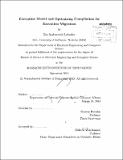Execution model and optimizing compilation for execution migration
Author(s)
Lebedev, Ilia Andreevich
DownloadFull printable version (19.63Mb)
Other Contributors
Massachusetts Institute of Technology. Department of Electrical Engineering and Computer Science.
Advisor
Srinivas Devadas.
Terms of use
Metadata
Show full item recordAbstract
Although systems with hardware support for fine-grained execution migration are becoming a reality, no concrete execution model or compiler exist for these machines. This limits the complexity of software that can be written for these machines, and therefore also the scope of studies for which these machines can be used. In this thesis, we define a productive programming model for an execution migration platform by exposing migration as a set of interfaces usable with the C programming language via a custom optimizing compiler. We employ hardware-software co-design to describe a stack core architecture with support for partial context migration in order to simplify the compiler problem and improve compiler efficiency. We also consider instruction encoding in abstract terms to establish a baseline comparison of encoded instruction density to an ideal upper bound. The stack-based execution migration platform offers a new and unexplored cost model, which leads us to reevaluate the trade-offs associated with compilation for these architectures, and to explore novel algorithms, or novel applications of existing optimizations. Throughout this work, we attempt to gain a deep understanding of the costs and benefits of execution migration by aggressive design space exploration. We use the insight gained to better inform the the problem of compiling to this unorthodox architecture, and design the compiler, a library of optimized parallel primitives, and a set of compiler optimization passes to best reflect and utilize the underlying hardware.
Description
Thesis (S.M.)--Massachusetts Institute of Technology, Dept. of Electrical Engineering and Computer Science, 2013. Cataloged from PDF version of thesis. Includes bibliographical references (pages 137-141).
Date issued
2013Department
Massachusetts Institute of Technology. Department of Electrical Engineering and Computer SciencePublisher
Massachusetts Institute of Technology
Keywords
Electrical Engineering and Computer Science.